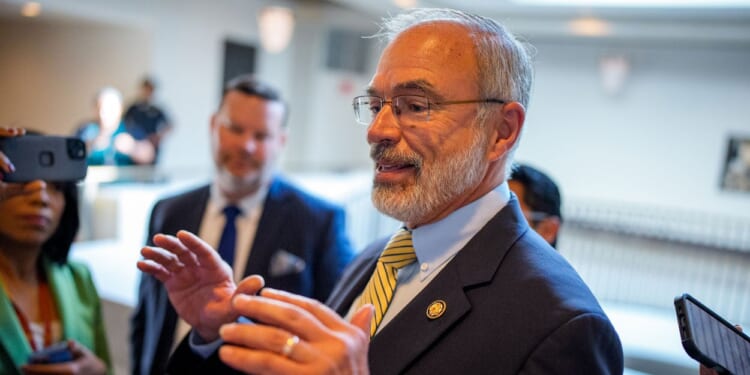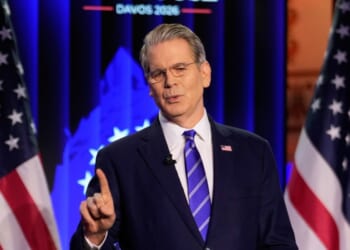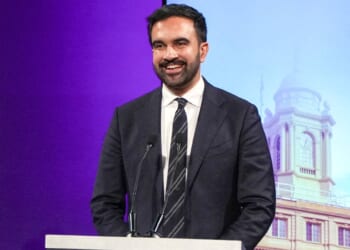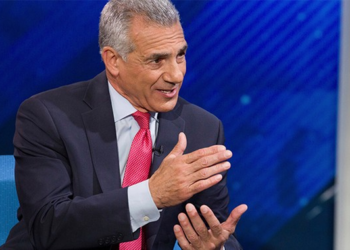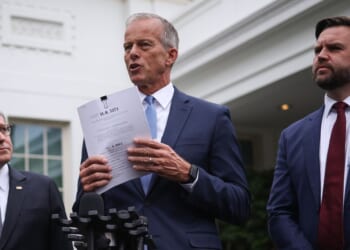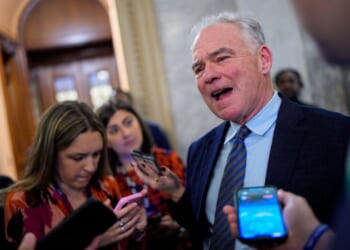House Freedom Caucus Chairman Rep. Andy Harris, R-Md., elaborated on the group’s support for a longer-term continuing resolution in an interview this week with The Daily Signal.
The group had released a statement on Monday supporting the passage of a continuing resolution to fund the government “as far into 2026 as possible (ideally, past the November 2026 election and with necessary defense stop-start anomalies).”
The statement went on to note that such a CR would “effectively keep federal discretionary spending flat at the same levels since 2023,” and “block any further effort by Democrats and the Swamp to advance a budget-busting, pork-filled, lobbyist-handout omnibus in November or December.”
The Daily Signal also received a statement from Rep. Paul Gosar, R-Ariz., who concurred. “Congress must act responsibly and pass a long-term continuing resolution to fund the federal government—not another short-term patch that merely delays the inevitable. These constant, stopgap extensions have become a political crutch, allowing Congress to lurch from one manufactured crisis to the next instead of governing with fiscal sanity and discipline.”
The Daily Signal asked Harris whether a CR funding the government beyond the November 2026 midterms had any precedent.
“Well, no, I think most of the yearlong, continuing resolutions are adopted later in the year. But again, we’re in unprecedented territory, where we have now the longest shutdown in history, and in an attempt not to allow the circumstances to repeat themselves, it would make sense that we would consider a continuing resolution until after the elections,” Harris said.
The Maryland lawmaker explained that the continuing resolution would keep funding level, noting that “the Democrats, and to some extent even the Senate Appropriations Committee, is increasing spending level funding.”
The House Freedom Caucus’ proposed longer-term CR “would at least be a first step toward dealing with our excessive federal deficit,” Harris added. The deficit was in the news of late as the accumulated national debt reached $38 trillion.
Harris explained that Democrats have already shown a willingness to shut down the government. He cited concerns about escalating side effects if the government is shut down again.
“Next time would be a little different, because all the reserve funds, of course, are expended. So, for instance, if we passed a continuing resolution the early part of next year, and they decided to close down the government, well, there are no reserve funds left in SNAP,” the Maryland congressman said, referring to the federal Supplemental Nutrition Assistance Program, informally known as food stamps.
His remarks came after the Trump administration said it would use emergency funds to cover about half of SNAP costs this month as the government shutdown drags on.
Pushing the issue of government funding past the 2026 midterms would likely lower the issue in the eyes of voters. The Daily Signal asked Harris whether he thought the current government shutdown had aided Democrats as a talking point in the Nov. 4 election.
“You know, it might have helped them in Virginia, where, of course, you have a high concentration of federal employees. But I don’t, I don’t think overall, it made that much difference,” Harris said, adding, “The outcome in New York was pretty clear for several weeks, even before the shutdown. And New Jersey, of course, is a perennially blue state, so that, of course, sent no message whatsoever.”
In the past, the House Freedom Caucus has opposed continuing resolutions. Harris was asked why the caucus was in favor of a continuing resolution now. He emphasized that a continuing resolution could be the most fiscally conservative point of view if the rest of the environment is calling for more government spending and the CR holds spending at the current level.
“[A]lthough we don’t like continuing resolutions, because we think the Congress should do its job and pass individual appropriations bills, obviously, the Congress is not going to do that in the near future, and then again, a continuing resolution, which does not increase spending, holds spending level, would appear to be one of the most fiscally responsible ways to proceed,” Harris said.
He also reiterated that he was supportive of two-year budget cycles, except for the Department of Defense.

